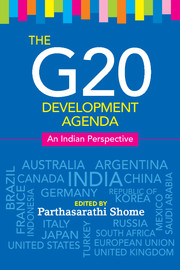Book contents
- Frontmatter
- Contents
- List of Tables and Figures
- Preface
- Section 1 Introduction
- Section 2 The Development Agenda
- Section 3 Energy Security and Environmental Sustainability
- 6 The Co-benefit Principle and the Durban Platform: Towards an Inclusive Framework for Negotiating Climate Finance
- 7 Greening the G20 Agenda: A Way Forward
- 8 Revisiting Fossil–Fuel Subsidies in the Context of Ongoing G20 Dialogue
- 9 Should India Join the International Energy Agency?
- Contributors
- Index
7 - Greening the G20 Agenda: A Way Forward
from Section 3 - Energy Security and Environmental Sustainability
Published online by Cambridge University Press: 05 May 2015
- Frontmatter
- Contents
- List of Tables and Figures
- Preface
- Section 1 Introduction
- Section 2 The Development Agenda
- Section 3 Energy Security and Environmental Sustainability
- 6 The Co-benefit Principle and the Durban Platform: Towards an Inclusive Framework for Negotiating Climate Finance
- 7 Greening the G20 Agenda: A Way Forward
- 8 Revisiting Fossil–Fuel Subsidies in the Context of Ongoing G20 Dialogue
- 9 Should India Join the International Energy Agency?
- Contributors
- Index
Summary
Introduction
Greening of the G20 agenda may be perceived in the context of global governance and, in particular, humane global governance because, greening at a global level or in a global scale is one area that cannot be aspired to, leave along achieved, without high level international recognition of the problem followed by strong cooperation and sacrifices in pecuniary terms. In proposing humane governance, Haq (1999) propounded the most comprehensive of all concepts of governance incorporating economic, political, and civic aspects, though questions of realism persist as to whether such a premise is achievable without a long-term roadmap beyond the familiar ephemeral memories of functioning societies. This becomes obvious from a reading of how humane governance is conceived. To quote Weiss (2000):
Humane governance involves those structures and processes that support the creation of a participatory, responsive and accountable polity (that is, good political governance) embedded in a competitive, non-discriminatory, yet equitable economy (that is, good economic governance). That requires the resources contributed by people to be ploughed back to serve their own basic human needs, which will in turn expand the opportunities open to them; people must be given the ability to self-organize (that is, good civic governance). Bounded together by such principles as ‘ownership’, ‘decency’, and ‘accountability’, the components of humane governance are inextricably linked. (p. 805)
The issues become somewhat incommodious in the context of global governance. The interconnectedness of individual economies with the inexorable advent of globalization through rapid progress in international trade, telecommunications and finance inarguably characterizes a new industrial revolution. The question that has naturally emerged is, how sustainable is this revolution from the point of view of maintenance of the global environment. This comprises a major cross-border challenge. In turn, it has permeated the G20 development agenda. The Framework for Strong, Sustainable, and Balanced Growth includes a wide agenda comprising objectives, actions and outcomes for the group as a whole (G20, 2009; Hersh, 2010; Ahluwalia, 2011).
- Type
- Chapter
- Information
- The G20 Development AgendaAn Indian Perspective, pp. 183 - 202Publisher: Cambridge University PressPrint publication year: 2015
- 1
- Cited by



